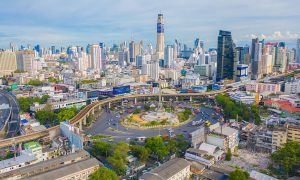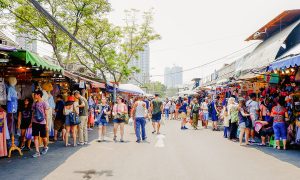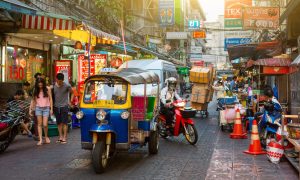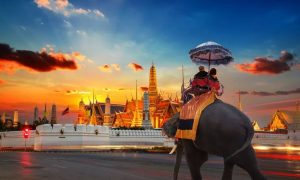In recent years, Thailand has takenLivable living environment, low cost of living, friendly expatriate policyIt attracts a large number ofOverseas Immigration. Whether it's for retirement, telecommuting, or investing in a business, Thailand is the ideal place for many. So what is the real life experience of moving to Thailand? InReal estate, health care, taxes and daily living costsIn terms, is Thailand really more advantageous than Europe, America, Japan and Korea? Today, we will analyze it in detail to help you make the most suitable decision!
I. The real cost of living in Thailand: Is the cost of living expensive or not?
A major concern for many people considering moving to Thailand is the cost of living. So, what are the daily expenses in Thailand? Compared to countries like Europe, America, Japan and Korea, Thailand is indeed aA cost-effective place to move toThe
🔹 Housing rent (Bangkok Metropolitan vs. Phuket vs. Chiang Mai)
- Bangkok Apartments(50 square meters): 8,000-25,000 baht/month (1,600-5,000 RMB)
- Chiang Mai Apartments(50 square meters): 6,000-15,000 baht/month (1,200-3,000 RMB)
- Phuket Sea View Apartments: 15,000-40,000 baht/month (3,000-8,000 yuan)
🔹 daily expense
- utilities:: 1000-3000 baht/month (200-600 RMB)
- Cellular + Wi-Fi:: 500-1200 baht/month (100-240 RMB)
- transport costs(MRT/BTS/taxi): 1000-3000 baht/month (200-600 RMB)
- Catering consumption(General restaurant): 50-200 baht/meal (10-40 RMB)
📌 Compared to Europe, America, Japan and other countries, the cost of living in Thailand is at least 30%-50% cheaperThe
Second, Thailand real estate investment and rental guide: buy or rent?
Thailand's real estate market has grown rapidly in recent years, especially in popular areas such as Bangkok, Chiang Mai, Pattaya and Phuket, attracting a large number of expatriates to purchase properties for investment or long-term residence.
🔸 Thailand Buying Policy: Can Foreigners Buy Property in Thailand?
✅ Expatriates can buycondominiumsLibyan Arab JamahiriyaThe percentage of foreign ownership cannot exceed 49% of the entire apartment buildingThe
✅ Cannot buy Thai landHowever, it is possible to hold land by setting up a company or by purchasing a house jointly with a Thai spouse.
✅ OptionalFreehold ApartmentsThe price is more competitive compared to Europe and the United States.
🔸 Thailand house price reference
- Bangkok, capital of Thailand: Downtown luxury condominiums 150,000-300,000 baht/㎡ (30,000-60,000 RMB/㎡)
- Chiang Mai, second city of Thailand: Condominiums 80,000-150,000 baht/㎡ (16,000-30,000 RMB/㎡)
- Phuket: Sea view condominiums 120,000-250,000 baht/㎡ (24,000-50,000 RMB/㎡)
📌 Suggestion: If you are staying for a short period of time, you can rent a house. If you intend to settle down for a long period of time, buying a house is a more cost-effective option, especially in Bangkok and Phuket where the return on investment is higher.
III. What is the level of medical care in Thailand? How do expatriates get medical coverage?
Thailand's healthcare system in Southeast Asiabe number one (best or worst)The medical cost is very high, especially in big cities like Bangkok, Chiang Mai, Phuket, etc., where medical facilities are advanced and international hospitals abound, and the cost of medical treatment is very high compared with that in Europe and the United States.Cheap 50%-70%The
🔹 Comparison of Medical Costs in Thailand(private hospitals)
- General outpatient visits: 800-3000 baht per session (160-600 RMB)
- Inpatient surgery (general surgery):: 50,000-200,000 baht (10,000-40,000 RMB)
- Medical Checkup Package (International Hospital): 5,000-15,000 baht (1,000-3,000 yuan)
📌 Medical insurance recommendations
✅ Purchase of local medical insurance in Thailand(Annual premium of about 10-50 thousand baht)
✅ Holders of a long-term Thai visa (e.g., a pensioner's visa) can join the Thai national healthcare system
✅ Expatriates can choose international medical insurance such as BUPA, AIA, etc.
IV. Tax policy on moving to Thailand: how to reduce the tax burden?
Living in Thailand, many people will be concernedtax policy, especially for expatriates with overseas income. Tax rates in Thailand are low compared to those in Europe and the United States and, in some cases, foreigners can legally reduce their tax liability.
🔸 Personal income tax (lower rates)
- Annual income ≤ 150,000 baht (30,000 RMB):0%
- 150,000 - 500,000 baht: 10%
- 500,000 - 1 million baht: 20%
- 1,000,000 - 2,000,000 baht: 25%
- 2 million - 5 million baht: 30%
- Above 5 million baht: 35%
🔸 property tax
- closing tax:: 2%
- Rental income tax: 5%-15%
🔸 Overseas Income Tax Credit(New policy 2024)
✅ Thailand does not tax overseas income(if the income was not remitted to Thailand during the year)
✅ Ability to manage global assets through an offshore account to reduce tax liabilities

📌 Suggestion: If one is a digital nomad, remote worker or has overseas income, Thailand's tax policy is very favorable to you!
Five,Thailand ImmigrationThe real-life experience: how easy is it to live?
✅ Life Advantages
✔ Low cost of livingSuitable for retirement or long term living
✔ pleasant climateFor those who prefer a tropical climate
✔ High level of medical careThere are many international hospitals.
✔ Large expatriate communityEasily adapted and integrated

❌ Life challenges
⚠ speech impediment: Thai is the dominant language, English is commonly used in tourist areas, but communication is difficult in some places.
⚠ visa policy: Long-term residence requires a suitable visa, e.g. pension visa, elite visa, investment visa, etc.
⚠ cultural adaptation: Thai culture is relatively Buddhist, and efficiency may be slightly slower than in Europe and the United States.
VI. Summary: Thailand is suitable forimmigrantsLong-term residence?
if youPrefer a tropical climate, seek cost-effective living, and want low taxes and quality healthcareThen Thailand is undoubtedly an ideal place to move to.
📌 Suitable for people::
✅ retiree(Pensioner's visa)
✅ Remote Workers & Digital Nomads(Low tax policies can be utilized)
✅ investor education(Real estate investment,business migrantetc.)






